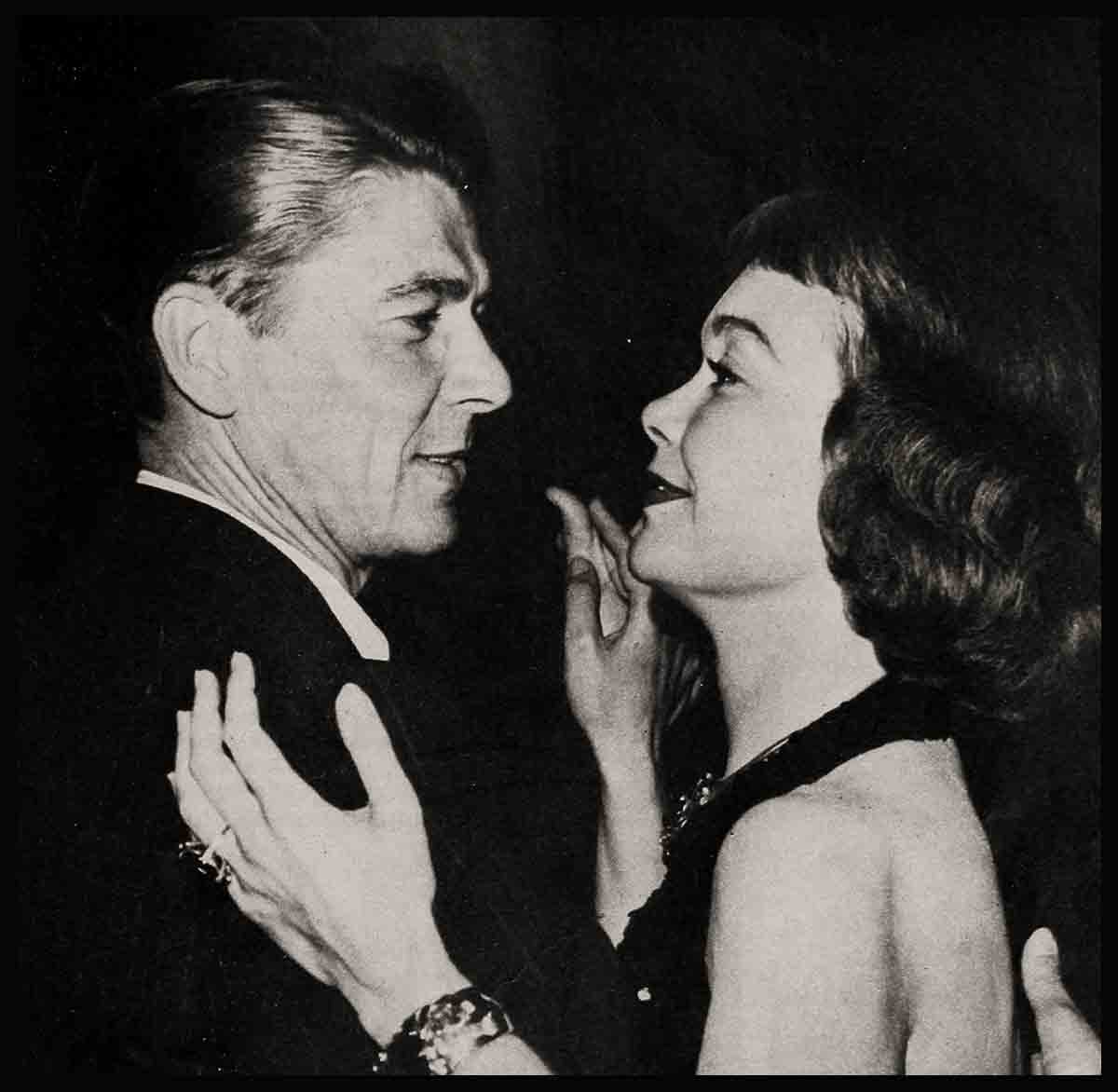
Are They Haunted By Their Perfect Love?—Jane Wyman and Ronald Reagan
I sincerely believe there’s not a chance in the world of Jane Wyman and Ronald Reagan being married lovers again.
And, just as sincerely, I believe they will never be free of that perfect love they once shared.
If this were not true—how does it happen that neither has been able really to fall in love with anyone else although two years have gone by since a judge handed Janie her final divorce decree, and their separation was a year before that?
Oh, yes, I know that Jane, so chic, so poised, so much a woman of the world these days, has thought she was in love several times.
There was the moody-broody interlude with Lew Ayres.
Wealthy Mannie Sachs was crazy about her—and Jane was flattered.
Whether they admit it or not, a spark ie ignited briefly, flared, and died down between Jane and good looking attorney, Greg Bautzer.
As for Ronnie—he’s had dates, naturally. He’s good looking, successful and—very human. But never for a minute has he even pretended it was love.
They are quite sure, Jane and Ronnie, that their love is dead, cold and finished without the tiniest ember still aglow. But, I wonder if they are equally sure that what they once had shared has not made the other loves too pale?
I say, truthfully, that in my many years of reporting Hollywood love stories, I have never seen two people more deeply and excitingly in love than Jane and Ronnie back in those days when they first met.
I introduced them, You might say I practically threw them together when I invited them to come out with me on my first personal appearance tour twelve years ago. (Can it really be that long?)
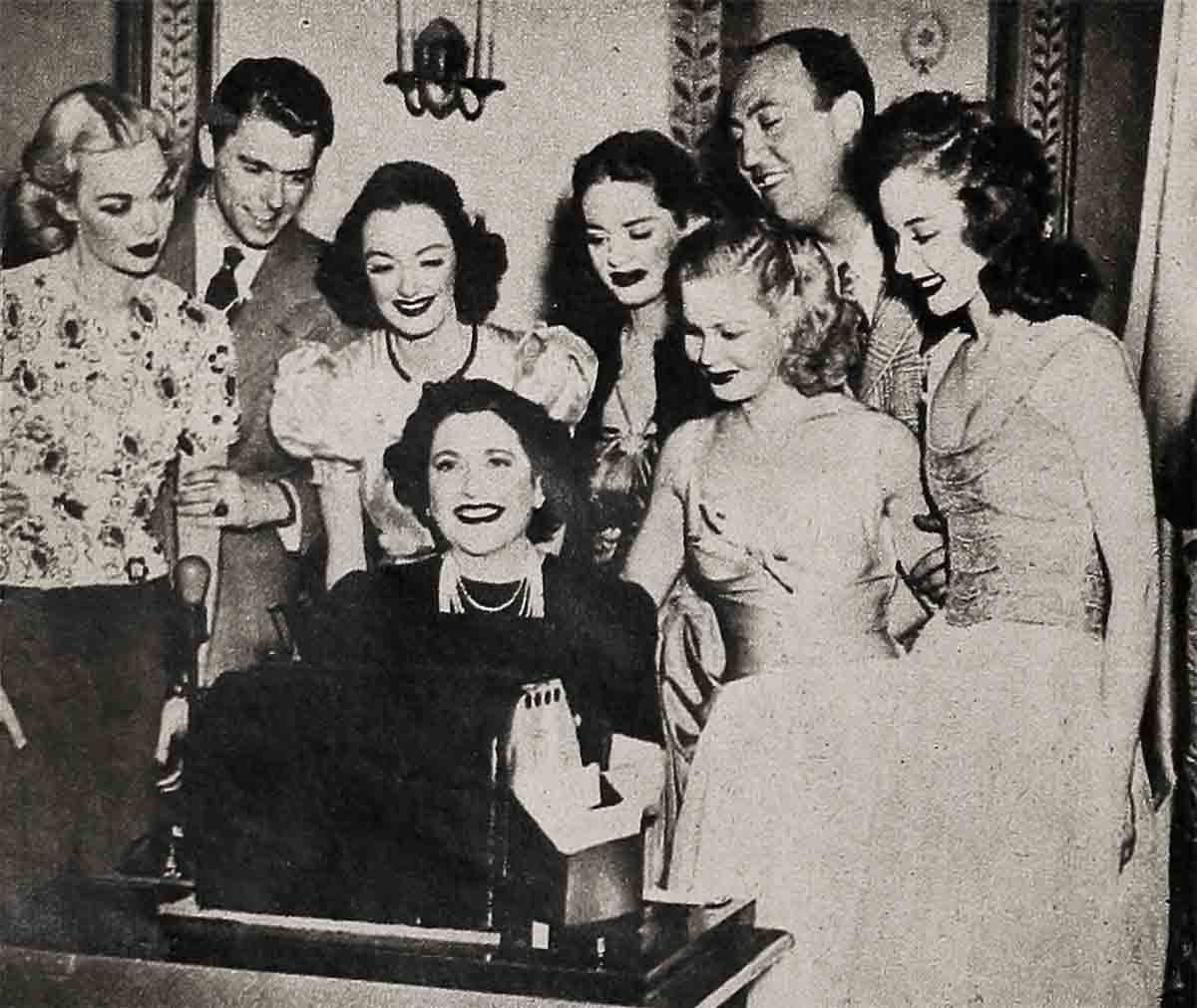
Ronnie, already a leading man at Warners, was my most “famous” name guest. Janie, still a stock player on the same lot, was making about $75 a week and playing bits. Redheaded and ambitious Susan Hayward and Joy Hodges were also just starting and mere fledglings careerwise.
Janie was openly and enthusiastically pleased at being invited along, and even before we opened our act in San Francisco it was obvious that she was especially pleased at being in such close proximity to Ronnie, whom she considered a “famous star.”
Forget for a moment the picture you have of Jane Wyman as she is today—the famed actress praised by critics and fans the world over, winner of an Oscar for her Johnny Belinda; forget her as the gay sophisticate and one of Hollywood’s “best dressed women.”
Instead, imagine a tall, rather bony girl, very young and pert with a shoulder-length bob bleached taffy blonde and a “burning desire to wear smart clothes and to own jewelry.
Only her limited income ent her from buying out the stores in every town we visited. Her dresses and suits, while not expensive and far from the custom frocks she wears today, were not really in bad taste.
She had no real jewelry. That was to come later—but she did have a great assortment of costume jewelry. You could actually hear her bracelets rattle two rooms away.
Jane had a one track mind where Ronnie was concerned, and no plans or ideas were separated from her overwhelming adoration of him. She was cute and pretty rather than beautiful with an ingratiating manner, almost an eagerness to please, which won her friends instantly.
After the nightly show, I used to take my group of starlets to some small nightclub café and when Jane wasn’t inching herself into a seat next to Ronnie at the table, she was at the piano with an admiring group around her. She had a sweet voice and loved to sing.
On these occasions, Ronnie would look at her admiringly and I’ve always had a hunch she wanted to sing because the lyrics expressed exactly what she thought about him!
Jane’s great friend was Joy Hodges, our singer on the show, and she and Jane were sort of teamed up against Susan Hayward and Susie’s pal, redheaded Arlene Whelan.
I’m sure that Jane and Susan have laughed about this “feud” many times since those days—but at that time, it was hot!
As part of the act, Susan had to slap Ronnie, and once or twice I had to speak to her because she hit him too hard. Jane, usually fuming, would stand in the wings and watch.
I knew—and I’m sure she knew I knew—she was there to protect her “interests.” Jane was just plain jealous.
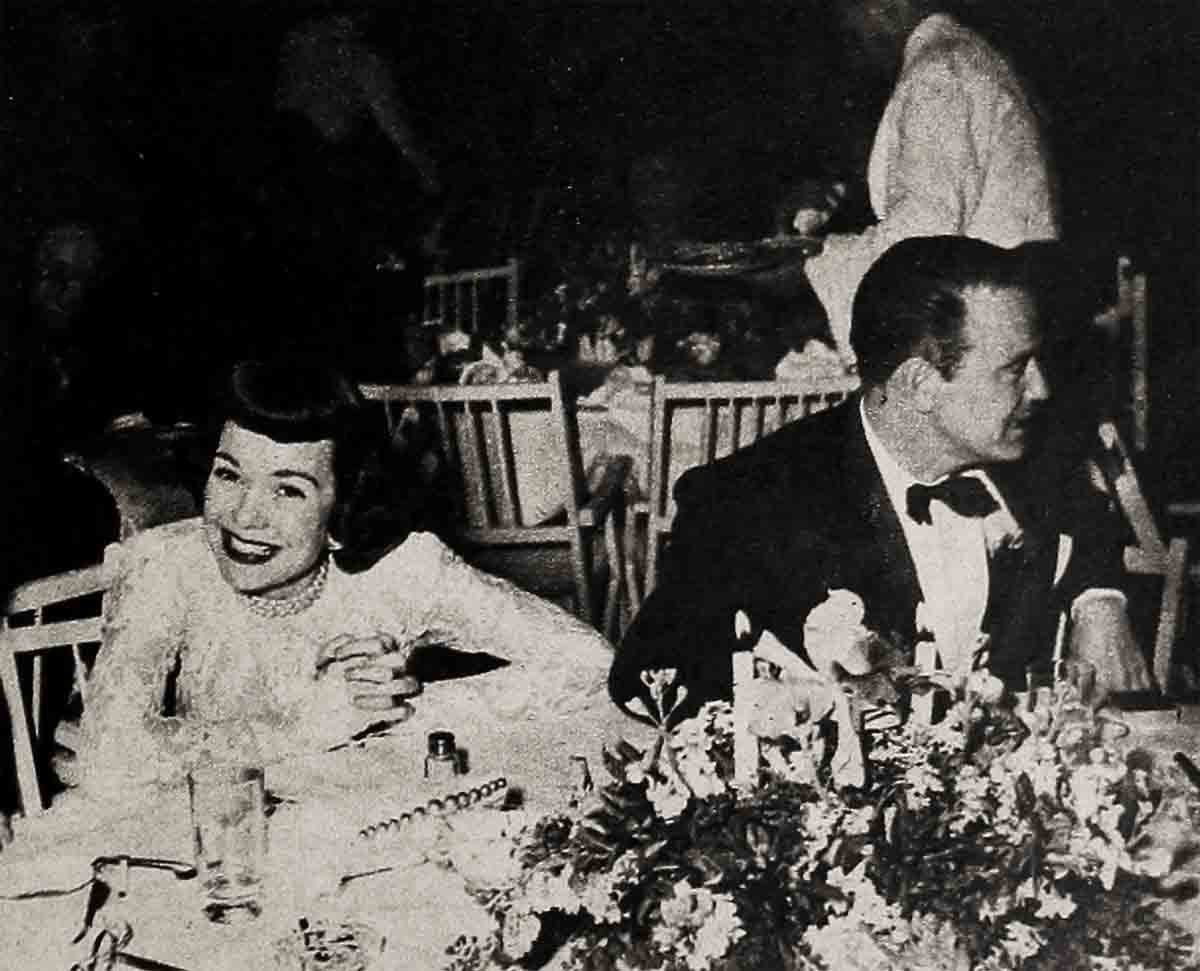
One day, I said to her, “Jane—Susan says it makes her nervous to have you watch her and Ronnie.”
With her eyes flashing, Missy Wyman tossed her blonde head.
“Too bad about her,” she snipped. “If I don’t stand and watch, shell knock Ronnie down! She hits him too hard!”
One day, when I was resting in my dressing room in Baltimore, Jane burst into the room almost breathless.
“I simply won’t let Ronnie act with that Hayward girl any more,” she stormed. “She just slaps him. that hard because she thinks it makes me mad. Say, do you think she’ll ever be a great star?”
“Yes, I do, Jane,” I told her barely able to keep my face straight. “I think Susie has great talent.”
“I have talent, too,” was the bombastic answer. “I’m going places—you wait and see. I’m sick of playing these gum chewing molls and when I get back to Hollywood I am going to walk right into Jack Warner’s office and say, “If you don’t give me better parts—I’m leaving!”
We had been on the road about three weeks when Jane told me that she was madly in love with Ronnie and that she was going to marry him some day.
It wasn’t as easy to tell whether love had struck Ronnie as violently as it had my spunky little Jane. A quiet, dignified type of boy—he was much more reserved.
Ronnie hails from my home town, Dixon, Illinois, and so, from the first there was a strong bond of home town interests between us, although he lived there long after I’d left the pretty town on Rock River.
We used to have long talks about Dixon and the Dixon folks, never realizing that one day he would return there with me for Louella Parsons’ Day and receive an unforgettable reception which warmed our hearts.
I had Ronnie summed up as a very level-headed, ambitious, young actor who planned to go places in a great, big way and who was hardly likely to be sidetracked with the responsibilities of marriage so early in his career.
That’s what I thought!
One afternoon, just before a matinee, I stepped unexpectedly out of my dressing room. Locked in an embrace that would have done credit to Scarlett O’Hara and Rhett Butler were Ronnie and Jane. Never in their careers have they played such a passionate love scene—and seldom have I seen the likes of that kiss!
I was far from surprised when they came to me in New York, a few days before Christmas, and said, “Mom—we’re engaged!” Then, both talking at once, they poured out their happy plans:
“We’re going to be married when we get back to Hollywood. We want Dockie (my husband, Dr. Harry Martin) to give Janie away”—and they were two delighted, eager children when I promised, “I’ll give you your wedding dinner at our house!”
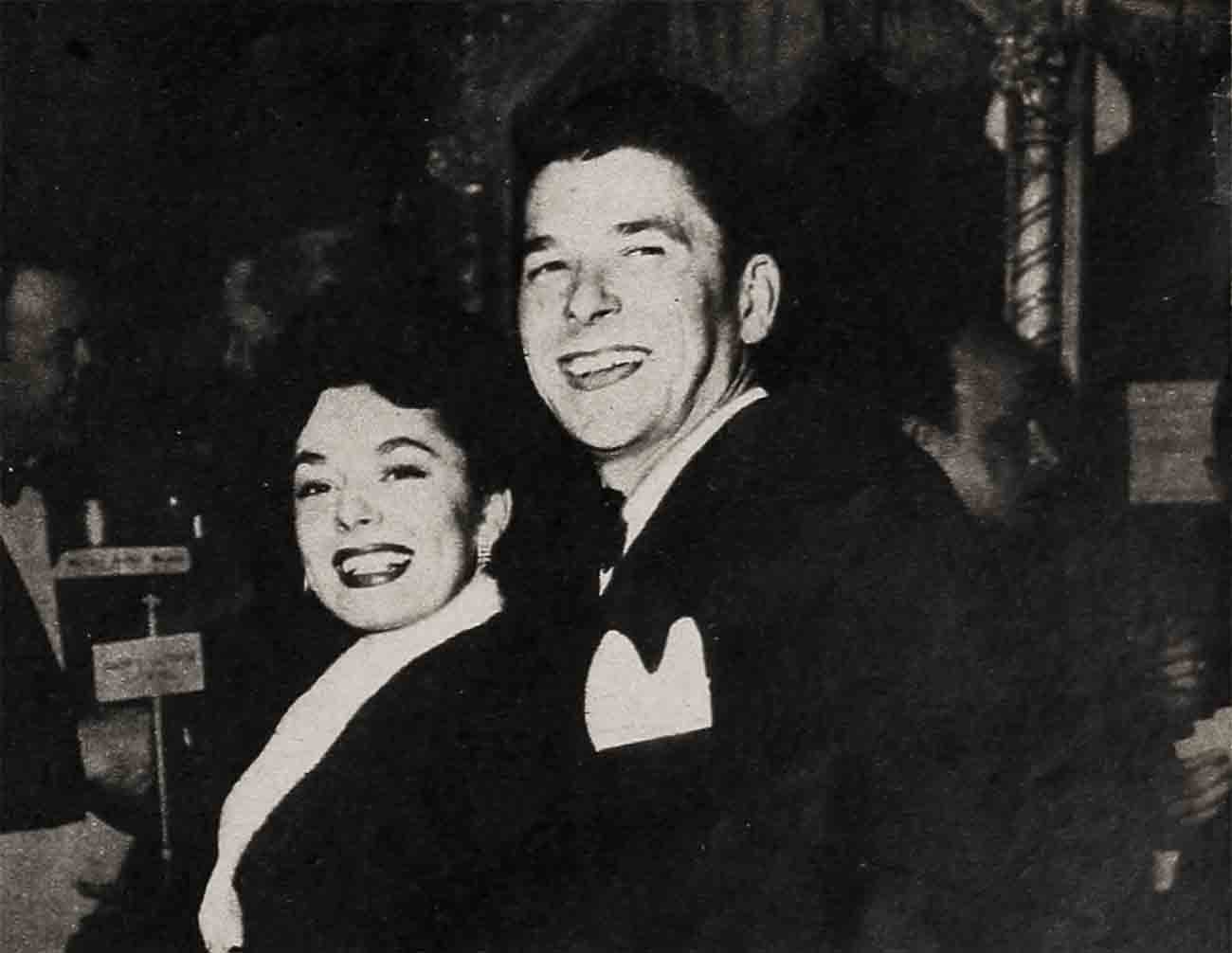
My Doctor, so happy over the role he was going to play in the wedding, came on to New York to join us—and I am sure that none of us will ever forget that Christmas.
While we were busy at the theater, Doctor went out and bought a tree for my gang of homesick kids, trimmed and decorated it in our hotel suite. We had the gayest of gay supper parties after the show.
It was wonderful just to watch Jane and Ronnie. The strong physical attraction between them actually sent out sparks. And yet we were all conscious of something stronger than just sex magnetism between the handsome, healthy and ambitious youngsters.
There was a new tenderness about Jane that gave her a new beauty and dignity—yes, in spite of the bleached hair and the bracelets that still jingled.
It was as though she had found in Ronnie someone she considered almost a god, and as though she must treat the great gift of his love with reverence and devotion.
Jane’s unhappy marriage in her youth was no secret. When she was sixteen and a model in New York before coming to Hollywood, she had impulsively married a young dress manufacturer, Myron Futterman. Although the marriage dragged on for two years, both realized the mistake early. When Jane came to Hollywood and Futterman’s business kept him in New York—a divorce was inevitable.
My eager-eyed, peppy little girl friend regretted this early marriage much more than the youthful mistake deserved. She wanted so much that Ronnie should be the alpha and omega of her emotional life. She wanted everything to be so shining, so wonderful, so first with both of them.
Ronnie told her and I told her that nothing mattered now except the two of them. By refusing to let her even mention her previous marriage, I believe it really began to fade from her memory.
“Ronnie is my first love,” she told me, “and he will be the last. Do you think other people have ever been so much in love as we?”
I didn’t have the heart to tell her that there was a bare possibility others had. There was something so touching and tender about Jane sincerely believing she had found something so wonderful it could not be shared.
The impulsive, immature girl who had started this trip with me had in seven short weeks become a mature and fascinating woman—and love had worked the transformation.
Ronnie had seen through her pretended frivolous exterior before any of us. Even when they had lovers’ quarrels (she was still a tiny mite jealous of Susan—or any other girl he happened to look at), he would say to me:
“There’s only one Jane. Nobody else like her.” Another time, he ruefully admitted after one of her explosions, “I admit it—it takes a bit of understanding—but she doesn’t fool me. Underneath that fire and temperament—she’s solid gold. She’s the only girl in the world for me!”
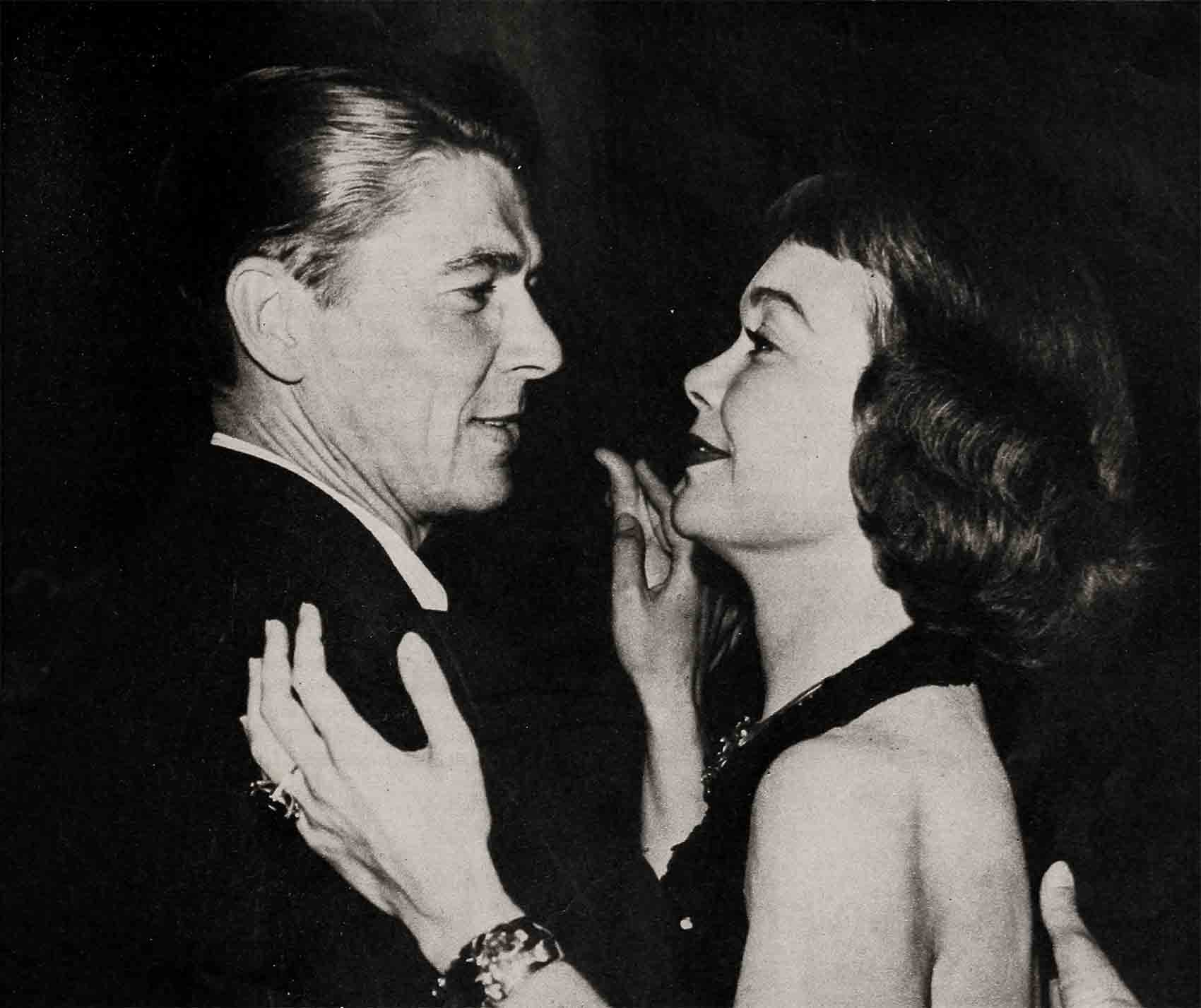
They were married at the Wee Kirk of the Heather Chapel on a chilly afternoon in January and, with the exception of members of my immediate family, I have never been so misty-eyed at a marriage ceremony.
Jane wore a beige suit, trimmed in fur, and a small fur hat on her head—still blonder than its natural color.
My Doctor looked so happy and proud as he walked down the aisle with Janie on his arm. Ronnie might have been an illustration of a happy groom from a magazine cover.
What a gay affair it was—not big—just Jane’s and Ronnie’s closest friends and Ronnie’s parents. It was typical of Jane that her best and oldest friend, Betty Kaplan, who had been her pal for years, was her matron of honor.
The champagne corks popped festively as we toasted the bride and groom or any other excuse we could think of to lift glasses and proclaim our happiness to the world.
But the sweetest moment of all to me was just before my “kids” slipped away. They called me into the library and whispered they were leaving. And, then, with tears streaming down all our faces, they threw their arms around me:
“There is no one in the world who could have given us such a perfect day. We love you very much—and you will always be part of our happiness.”
The others got wind that the newlyweds were stealing away—out came the rice and there was much shouting and yelling as we pelted the bride and groom in the old-fashioned way. There were still tears of happiness in my eyes for them as I watched them drive away.
Mr. and Mrs. Reagan (how she loved being called Mrs. Reagan) took an apartment at the Sunset Plaza not far from our Maple Drive home. We saw each other frequently during the first months of their honeymoon but, one day, Jane’s voice was particularly excited as she called to say we must come to dinner. It was somethingspecial.
And it was! She had just found out she was going to have a baby (Maureen). That is, she had found it out 24 hours before, and she had already gone out and bought baby clothes which she proudly showed me.
Happy? They were both in heaven and so were Doctor and I for them.
By this time Ronnie was going ahead by leaps and bounds in his career. Janie was advancing, too, at Warners. But now her career was in second spot in her world. Everything was the baby, the baby, the baby.
I once asked her if she thought she would give up her career to have children and be just Mrs. Reagan.
“Oh, no,” she said. “I want to have both. There is something inside me I must express. Ronnie understands. He believes in me as much as I believe in myself.”
Some months later we were again invited to the Reagan apartment.
“Please come early,” Janie said. “We want you and Dockie to see Maureen. It’s the nurse’s night out and I am taking care of her. You know,” said Jane, “we are calling her Maureen. At first, we had planned to name her Louella but—” she broke off a little shamefacedly fearing I might be hurt— “we love the name Maureen.”
“It’s all right, dear,” I told her, “I never really liked my name myself. I wouldn’t call my own child Louella. Besides I have a namesake in my niece.”
“Ronnie and I thought you might be offended since we promised to name our first after you,” she laughed.
Dinner that night was served while Maureen slept. Jane, the devoted mother, kept running to the nursery to peek at her. Ronnie, the doting father, slipped away while we were having dessert to be sure she was covered. The nurse had told him the baby mustn’t be uncovered and that she must be changed.
“Aren’t they sweet?” I asked my husband on the way home.
“They are, indeed,” answered my favorite doctor. “But just how long do you think Jane is going to play this scene of perfect domesticity? That girl has genuine talent and she isn’t going to rock the cradle indefinitely.”
Wise man, that doctor husband of mine. Indeed, Jane wasn’t going to go on indefinitely rocking the cradle. She loved Ronnie—she adored Maureen—but she was ambitious.
Life then and later was very wonderful for the young Reagans.
Then came the war, and Ronnie was made a captain in the infantry and stationed at San Francisco. It so happened that Dr. Martin was at Letterman Hospital, a major in the medical corps. Both Jane and I very often went to the Bay City to visit our Army husbands.
One night I remember especially we all had dinner at the Fairmont Hotel.
Jane was unhappy because Ronnie was not stationed closer to her and she feared he might be sent overseas. They were so much in love that they actually suffered at the thought of this separation.
But Ronnie’s eyes were not good (his vision was dim) and it was not long before he was transferred to an office job at the Roach Studios in Los Angeles.
It was then that the Reagans decided to adopt a little boy to keep Maureen company—little Michael. He was as dark as she was fair, and Jane and Maureen and Ronnie showered him with as much love as though he were their own blood.
With the increase in their family they moved into a beautiful Colonial home in Holmby Hills and were thought of as a “perfect” married couple.
In the years that followed, Jane and Ronnie had so much, so very much. They entertained beautifully and were part of the happy married set numbering the Jack Bennys, the Johnny Greenes, Barbara Stanwyck and Bob Taylor, and others. Ah, indeed, life was really beautiful.
Janie was loaned to Paramount to costar in The Lost Weekend which won Ray Milland, and the picture, the Academy Award. Our pretty little girl was rapidly becoming an actress of great artistic stature. No longer just the little cutie who broke up movie homes, she was regarded as a rival to Bette Davis, then queen of the Warner lot.
It was obvious that this growth professionally was changing her personally. Gone was the glamor girl blonde bob. Instead, Jane had cut her hair short and neat and let it go back to its natural dark color which brought out her dark, expressive eyes so beautifully.
Someway our lives always seemed to dovetail. Jane was borrowed by MGM for The Yearling. The company went to Lake Arrowhead for the exteriors. Dr. Martin and I had rented a summer home on the lake and we saw Jane a number of times while she was making the picture—her first fling into sheer characterization as the unglamorous mother.
The following winter, fate again brought us together. Doctor, who hadn’t been very well, went into the hospital for a complete checkup. In the next room was Ronnie with a very bad case of virus flu. Jane came every day, as did I to visit “our boys.”
They confided that Jane was expecting another baby. How deeply happy they were over the news. There was Maureen and Michael, and a third child would be very welcome.
Then, one day I walked into the hospital and Ronnie’s nurse told me he had asked to see me—privately. He told me with tears in his eyes that Jane had lost the baby and that she was in Queen of the Angels Hospital quite ill.
“I feel so terrible,” he said, “because I know if she hadn’t had to make this long trip to see me every day after work this might not have happened. It. was physically too much for her.”
Who can’t say that the fess of that baby had anything to do with the strain that began to be apparent between them—but it seemed to me from that time on there was a change in their attitude toward each other.
Jane seemed to actually throw herself into her career and Ronnie was rapidly becoming one of our most active citizens politically. He was elected president of the Screen Actors’ Guild and he attended meetings night after night leaving Jane alone.
Just about this time, Jane started Johnny Belinda, the picture that was to win her the coveted Oscar. Ronnie was busy making speeches. She talked over this wonderful role with Lew Ayres who played opposite her.
For the first time, Jane and Ronnie were going their separate ways. Then, like a bolt from the blue, came the news that Jane and Ronnie had parted.
She left for New York, and over the long distance telephone told me the bitter and sad news. I was speechless. I just couldn’t believe it.
I asked Ronnie to come and see me. I’ll never forget that session.
“I am married to a strange girl, Louella, but a wonderful one,” he said. “No one can make me believe that all we have had between us is over.
“Right now, Jane is so deep in her work that she is actually living her roles. She brings them home with her. She is the character that she is playing on the screen.
“But Jane and I will be together again. That you can stake your life on!”
But Ronnie and Jane weren’t together again!
I lunched with her when she came back from New York. She was smartly dressed, she was gay. But she would not discuss her matrimonial troubles beyond saying, “Ronnie likes his work as president of the Guild. He isn’t unhappy.”
I hoped against hope they would kiss and make up. But the months dragged by—and then one day, Jane filed suit for divorce.
I confess I am baffled—more baffled than I have ever been by a Hollywood love story.
Not long ago, I went to a dinner party at their home and Maureen came in to cut her birthday cake. Her mother and father stood by her side, polite to each other and respectful—so different from those gay kids who went barnstorming with me. I turned away so they couldn’t see the tears in my eyes.
Since then, when I see Janie, she seems self-sufficient, independent, and, oh, so gay. But I know that not long ago she said to someone, “What’s the matter with me? I can’t seem to pick up the pieces of my life again. Will I ever find happiness ahead?”
And, one of the lovely girls Ronnie seemed interested in for awhile told me he recently said to her, “Sure, I like you. I like you fine. But I think I’ve pores how to fall in love.”
I wonder—do those embers of the once perfect love they shared still burn deep haunting memories that won’t let them forget?
THE END
—BY LOUELLA PARSONS
It is a quote. MODERN SCREEN MAGAZINE FEBRUARY 1951


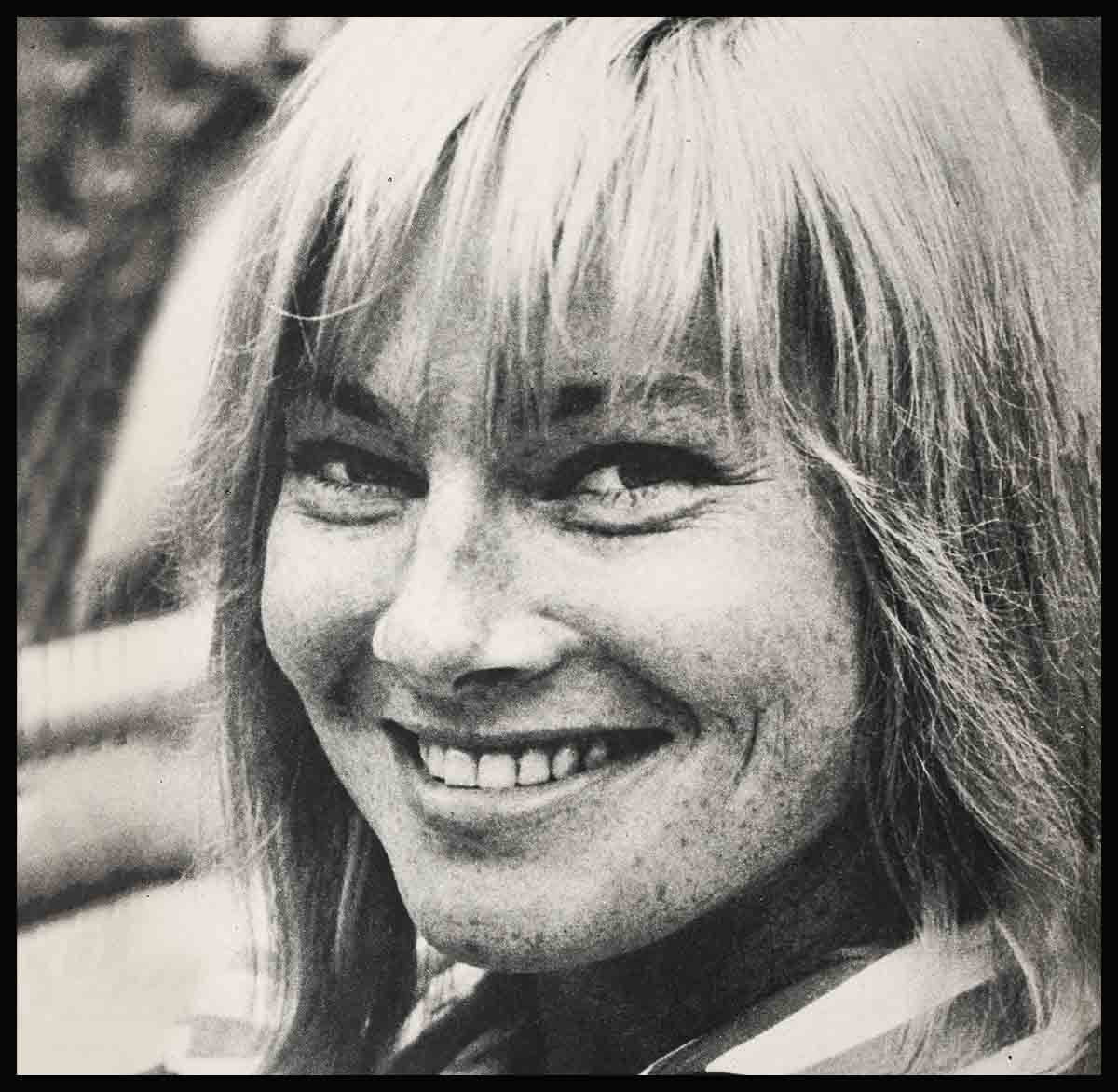

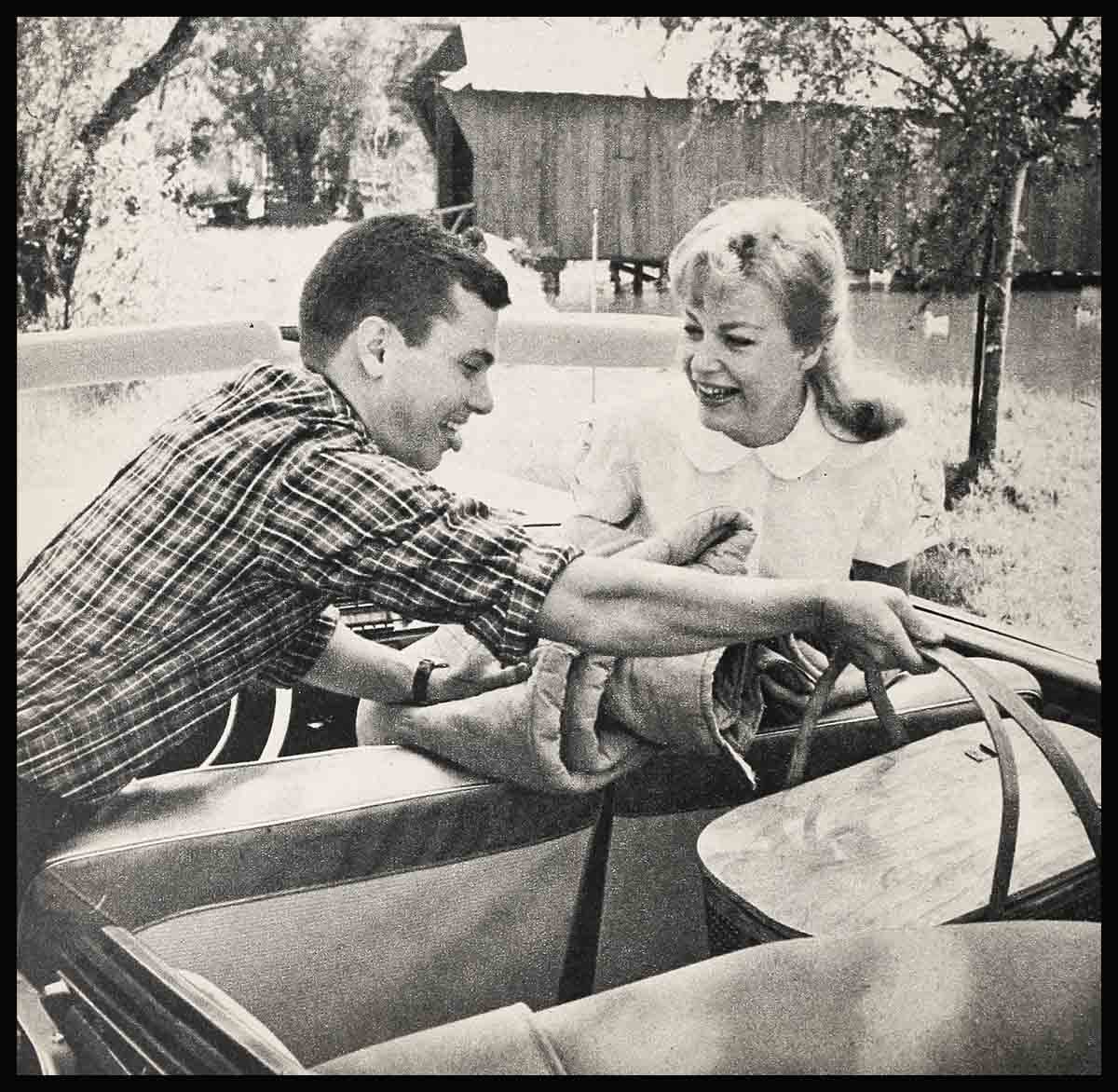
No Comments